July is Disability Pride Month and at IGLTA we want to celebrate all LGBTQ+ functionally diverse travellers who despite the many obstacles, travel the globe defying stereotypes and misconceptions.
For this section, I spoke to a close friend who decided to share his experience travelling with a mobility disability around the world. Listen up tourism businesses, because there are some very important recommendations for you at the end of this article.
Nicolas Ceballos (he/him), is a 38-year-old lawyer and a professor of law at two of the most prestigious universities in Medellín, Colombia, where he is also from. He describes himself as a marica (similar to queer in English) cisgender male who lives with reduced mobility. Specifically, his condition is called osteogenesis imperfecta (OI), a genetic disease related to the formation and development of the skeletal system.

Nicolas Ceballos, in Torre de Belém near Lisbon, Portugal
Nico, how would you describe your favourite type of travel?
I love travelling to big cities where in one single place you can have several highlights to see and it’s easy to get around as they are not spread out. As you can imagine, this preference as well as the destinations I choose are marked by my condition, as the less I have to move around to go to the places I want to see, the better. The more I can shorten plane, train or bus trips, which are the annoying part of travel, the better.
This is also linked to the fact that I like cultural travel. Going to museums, theatres, places with renowned cuisine, etc. I like this type of travel much more than adventure or nature travel, which I don’t like as much. I see a pretty landscape and think, ‘that’s nice’ but there’s nothing more for me to do.
What destinations have you visited that describe what you mentioned: vast cultural offerings in a relatively easily accessible area?
The last trip my family and I did was to Barcelona, which has a wide array of things to see and do and we spent several days here. Some years ago we went to New York and Philadelphia. We were also in Montreal visiting my sister who lives there and we have also done Buenos Aires. So these are the types of destinations I am talking about when I talk about big and accessible places.
In those destinations you have mentioned, what kind of obstacles or difficulties have you faced?
Many obstacles are faced by people like me. These cities with a dated cultural offer in Europe, South America and even more modern cities like New York are associated with an old history of urbanism and very old buildings which tend to be linked to inaccessibility. Buildings without elevators, ancient parts of cities that are cobbled stoned or similar, staircases or even irregular urban traces and streets.
This was a problem I faced recently when I was in Lisbon. The center of the city, which is a highly touristic area, dates back to the 18th century. There were hills and it was all cobbled stones so the urban design itself was already difficult to access and inhabit and that for once is a huge obstacle. Second, it’s difficult for public transport to be completely accessible in cities. Of course, there are cities that are more pedestrian-friendly but you can’t get everywhere without a car and of course, there are areas of these cities that offer a certain level of accessibility but it rarely ever is extensive or completely accessible. For example, metro systems are rarely completely accessible and not all stations have elevators.
Another example of difficulties while travelling to these destinations is accommodation. Not always is the information in hotels or short-term accommodations transparent when it comes to accessibility. Many times you may see an elevator on a listing or hotel but when you get there, there are steps to get to that elevator. These extra steps are literally and figuratively because this lack of transparency forces you to contact hosts or hotels about specifications. Different from other travellers, I can’t just check for the cheapest or closest hotel.
One experience you want to positively highlight?
Barcelona was a really good experience, and I think Spain has really advanced in accessibility laws. Additionally, Barcelona’s urban disposition is quite privileged in terms of public transport and pedestrian areas and we were easily able to find an apartment on Airbnb that was completely accessible because many of these old buildings have been adapted with an elevator. I also want to highlight that the airports in Spain seem to be highly sensitized towards disability issues.
NYC is also a great example. Despite not all the subway stations being accessible, there is a big cultural disposition to helping and organizing around accessibility.
Let’s talk about the intersectionality of being queer and disabled. Does that intersectionality come into play when you are planning a trip? Does it influence your choice of destination?
It hasn’t been as explicit but I definitely think about safety as a disabled LGBTQ+ traveler. I would not enjoy going to a place where I would fear for my safety in many aspects. So, in countries where the State itself represents a danger to me because it is illegal to be LGBTQ+, I would not want to visit. I don’t want to open the possibility of having to worry during a holiday because of what could happen to me if I was stopped by the authorities. More than LGBTQ+ phobia, which you can find everywhere, for me it has to do with an additional layer of insecurity provided by an unfriendly State.
Is there a destination that you dream of visiting but have avoided because of what you mentioned above?
Well, I have definitely thought about this more in terms of my disability. I think that outside of Latin America and the Global North, I haven’t dared to visit other places. I would, for example, love to visit India, but I imagine so many difficulties of being in India as a traveller in a wheelchair. I would love to go to Morocco too, but I am not sure how accessible Marrakech is. I love North African and South Asian cultures but I wouldn’t dare travel there. Additionally, a place like China would be amazing to visit, but I wouldn’t want to be stressed about what could happen to someone like me if I got in trouble while visiting an oppressive State.
Let’s talk about recommendations for tourism businesses, what would you recommend a tour operator to better suit travellers like you?
-
Transparency in information. If you offer a tour, make sure to highlight if it’s accessible or not, and if not, what kind of support would a person with reduced mobility need to take that tour.
-
Highlight the type of transportation you will employ, a van is not the same as a bus for example. Those small details that sometimes people overlook, for a person like me make an enormous difference.
-
Explicitly state recommendations depending on the type of needs someone may have. “If you are in a wheelchair please take into account the following” “If you are LGBTQ+ here are some recommendations.”
These are relatively easy things to do and would make a world of difference for a person like me.
What about airlines?
Airlines tend to be the trickiest with accessibility. Because when you are in an airline, you are completely vulnerable. They strip you away of your mechanism of support. When you’re on the plane, they’ve already placed your wheelchair in the baggage storage and they tend not to be very aware of our needs. For example, when they use staircases instead of a bridge it feels like an infringement on my humanity.
-
Train your staff much more on disabilities and how to handle situations; make them aware of the vulnerable state we are in when we fly.
Hotels and short-term rentals?
-
Better and more transparent information so that we don’t have to take the extra steps to make a booking.
-
When you refurbish rooms or adapt them to be accessible, don’t just think of one or a few rooms, it should be proportional to how common mobility disabilities are around us. And in the end, these adaptations and accessible designs end up benefiting everyone.
Disability Pride Month serves as a powerful reminder of the resilience and strength exhibited by LGBTQ+ and functionally diverse travellers. Remarkable individuals like Nico, refuse to be defined by limitations and demonstrate that their unique perspectives enrich the travel experience for everyone. By sharing their stories and embracing their identities unapologetically, they pave the way for a more inclusive and compassionate world. As we celebrate those in the LGBTQ+ community that live with disabilities, let us continue to champion accessibility, understanding, and acceptance in the realm of travel and beyond. By doing so, we can create a more welcoming global community where every individual can explore, connect, and thrive without barriers, truly celebrating the diversity that makes us all extraordinary.
Happy Disability Pride Month from all of us at IGLTA!

Nicolas and me before a theatre show in Medellín.